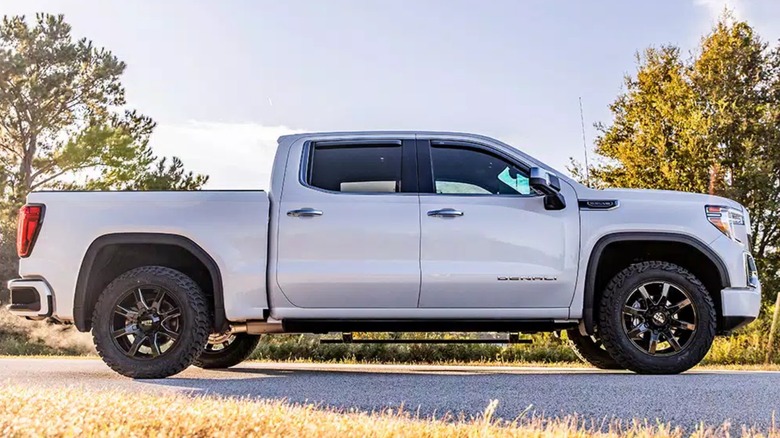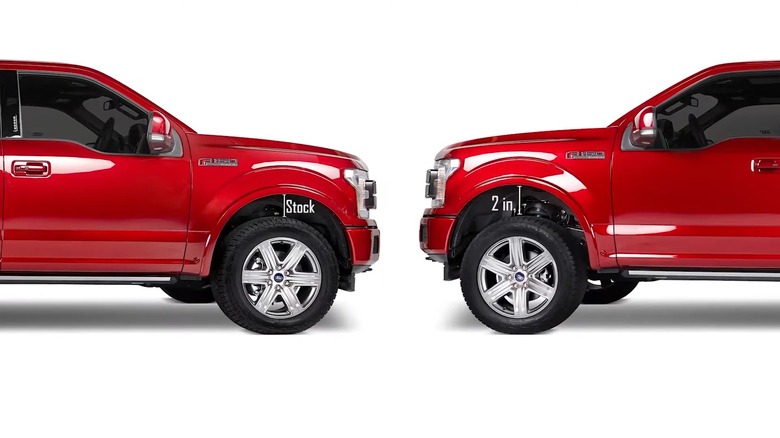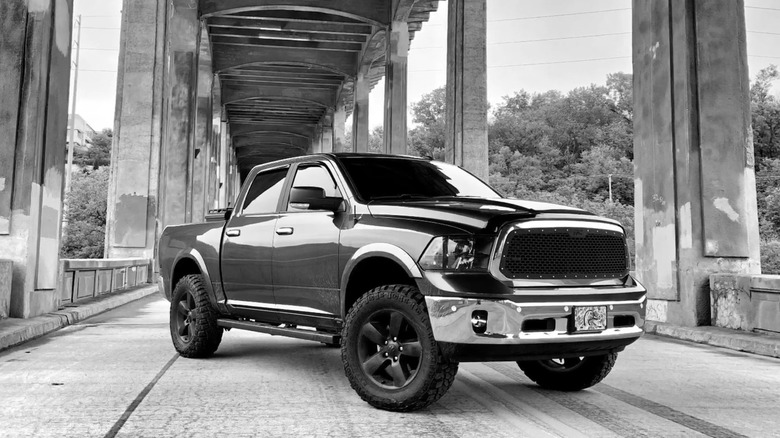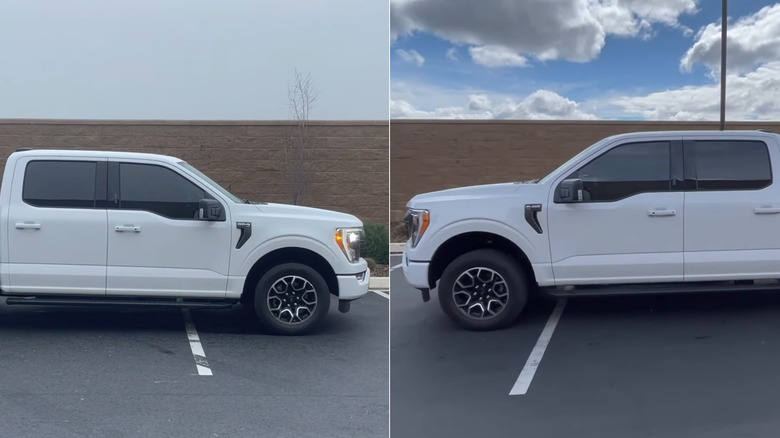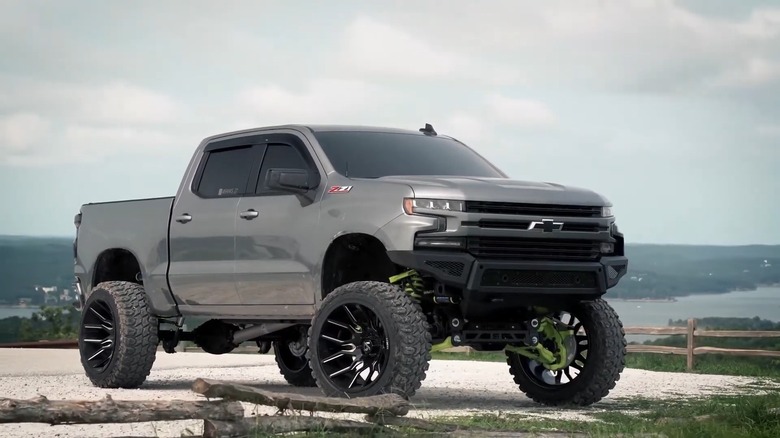What Is A Leveling Kit And Can It Hurt Your Truck?
You may have noticed the vast amount of exterior accessories for truck owners. Some of these components are designed to increase your ride's performance or off-road capabilities, while others are designed more for aesthetics and personal style. One popular type of truck mod that you may have heard of but not quite understand is a leveling kit. Like other suspension modifications, leveling kits are designed to augment your truck's ride height. However, unlike many lift and coilover kits, leveling kits aren't usually designed for maximum height. Rather, people use leveling kits to, as the name implies, level their vehicle's ride height.
That's because pickup trucks often come with large, heavy engines and beefy rear ends. The engines are designed for maximum torque and horsepower outputs, allowing drivers to pull hefty loads and stand up to heavy-duty applications and hobbies. Truck rear ends are built with robust suspension systems to accommodate those heavy loads. Due to the large engines and stout rear-end suspension systems, pickup trucks often sit lower in the front end, giving the vehicles an unlevel appearance that many drivers dislike and consider unattractive.
Leveling kits address this issue by allowing us to lift the truck's front end to match the rear end's height. They're popular modifications, and, depending on the type of kit and your vehicle, they're not too difficult to install. If you want to learn more about leveling kits, you're in luck. As a former professional auto repair technician who spent years focusing on suspension and steering systems, I'll break it all down for you. We'll explore the benefits of leveling kits, how they work, and whether they can damage your truck. Let's dive in and check it out.
What are the benefits of a leveling kit?
As mentioned, pickup trucks tend to slope down toward the front end. We've already explained that's caused by the fact that these vehicles typically have heavy engines in the front and lighter rear ends with very robust suspension systems. That design is intentional and meant to prevent excess sagging and suspension damage when heavy loads are placed on the rear end. However, that sloped look — sometimes called rake — isn't the most aesthetically pleasing, and many owners choose to eliminate it with a leveling kit.
When it comes to the reasons why you might install a leveling kit, there are several benefits. One of the main factors motivating drivers to purchase leveling kits is aesthetics. Many people dislike the forward-sloping look that comes with stock pickup trucks. Installing a leveling kit can even out your ride height — even if it seems insignificant, the difference between a truck with a leveling kit and one without can be stark. Leveled trucks tend to look much more aggressive, and many drivers prefer a neat, level suspension.
Besides looks, leveling kits provide a few additional benefits. One of those benefits is the ability to use larger, beefier off-road tires. Leveling kits typically provide about 1 to 3 inches of front-end lift. It may not seem like much, but that extra space can mean the difference between buying four equally sized tires and buying one set for the rear and one set for the front end. Finally, leveling kits can improve your truck's off-road performance by increasing its front-end ground clearance. Even small height gains can make a huge difference when driving off-road, and a leveling kit can be a quick and easy way to take your pickup's off-road capability to the next stage.
Can a leveling kit hurt your truck?
If you're considering installing a leveling kit on your pickup truck, you may be curious if there are any downsides. Generally speaking, leveling kits won't hurt your truck in the same sense that smashing into a telephone pole will. However, they can come with a handful of negative consequences.
When it comes to the downsides of a leveling kit, most of them are pretty minor. Things like slight decreases in fuel economy can occur due to the reduction in aerodynamics that come with leveling kits. However, those drops in gas mileage are essentially negligible in comparison to those you'll see if you opt for a complete lift kit. Next, leveling kits can decrease driver visibility, especially at first, as you get used to the new ride height — again, that's more common with full lifts, though, and small leveling kits shouldn't have a huge effect on your field of vision.
Some of the more serious consequences of installing a leveling kit include things like potential suspension damage and warranty issues. While most leveling kits are designed to maintain your stock suspension and steering, others may require modifications, which, if performed incorrectly, can lead to increased wear or damage to the suspension and steering systems or void your manufacturer's warranty.
The best way to avoid these issues is to research several types of leveling kits to identify the best product for your truck. It's also a good idea to consult a suspension expert and hire a professional technician to install the kit for you. Doing so will help to ensure that your parts get installed correctly, and your ride remains safe and comfortable.
How do leveling kits work?
Most kits are fairly basic and don't require making substantial modifications to the stock suspension system. Leveling kits generally raise the front end using either spacers or aftermarket torsion bar keys.
There are two primary types of spacers you're likely to encounter in standard leveling kits: strut spacers or extensions and coil spring spacers. Both types are designed to bolt above or below the stock components and lift the front end. Depending on the brand, these kits may or may not include the necessary bump stops and shock extensions — if they don't, you may have to buy longer shocks or other aftermarket parts. Spacers are usually quick and easy to install, and if the kits come with all of the necessary parts, you typically don't need to buy anything extra or make other modifications to the stock suspension.
Torsion key leveling kits are designed for vehicles with torsion bar suspension systems. Many of these vehicles come stock with a limited form of ride height adjustment. Torsion key leveling kits replace the stock key or cam with one capable of a greater range of movement, and are also generally pretty easy to install.
Outside of spacers and torsion key leveling kits, you may see more expensive and complicated options like loaded or quick struts and replacement springs. These components are usually just longer, beefier versions of their stock counterparts, but they may be more costly and challenging to install.
What's the difference between a leveling kit, a lift kit, and a body lift kit?
We've covered a lot of information about leveling kits, and we mentioned that these devices differ from standard lift kits. However, you might be curious about some of the specific differences between leveling kits and other modifications like body and suspension lifts.
Put simply, lift kits are designed to raise the entire vehicle. In comparison to leveling kits, which are intended to raise only the front end a small amount to match the rear end, lift kits are meant to raise the entire truck equally to accommodate larger tires, increase ground clearance, or improve aesthetics. However, not all lift kits are the same. Specifically, there are two common types of lift kits that you're likely to encounter: body lifts and suspension lifts.
While both types of lift kits will raise your truck or SUV, they don't achieve that feat in the same way or provide the same benefits. Body lifts are built to raise the vehicle's body or cabin off the frame about 2 to 5 inches. They're designed more for aesthetics than utility, as the suspension and ride height remain unchanged. Suspension lifts, on the other hand, require replacing stock parts, like shocks, struts, and coil springs, with larger aftermarket versions. These kits are capable of raising the vehicle much higher off the ground and are ideal for those interested in drastically increasing ground clearance and installing significantly larger tires.
